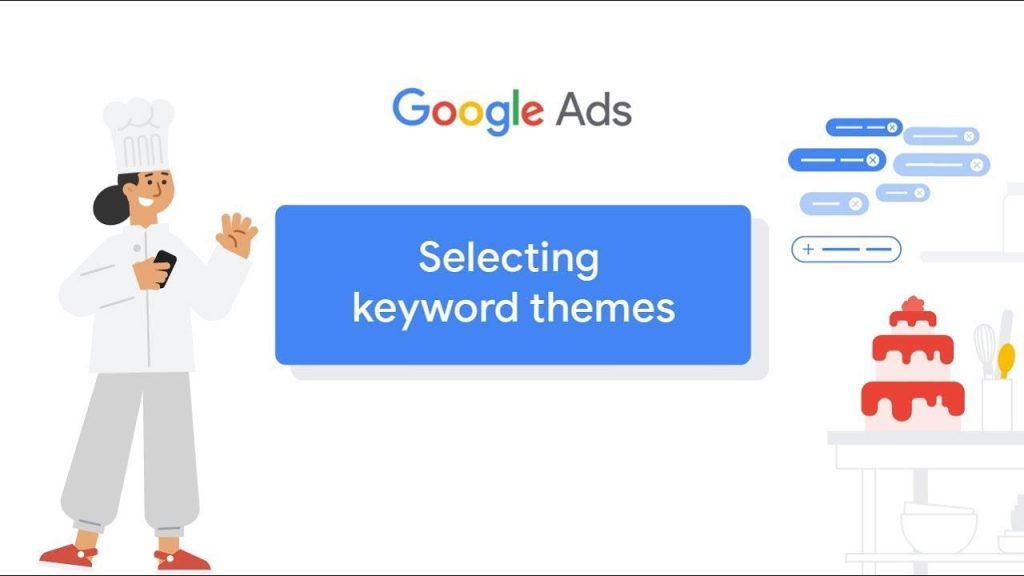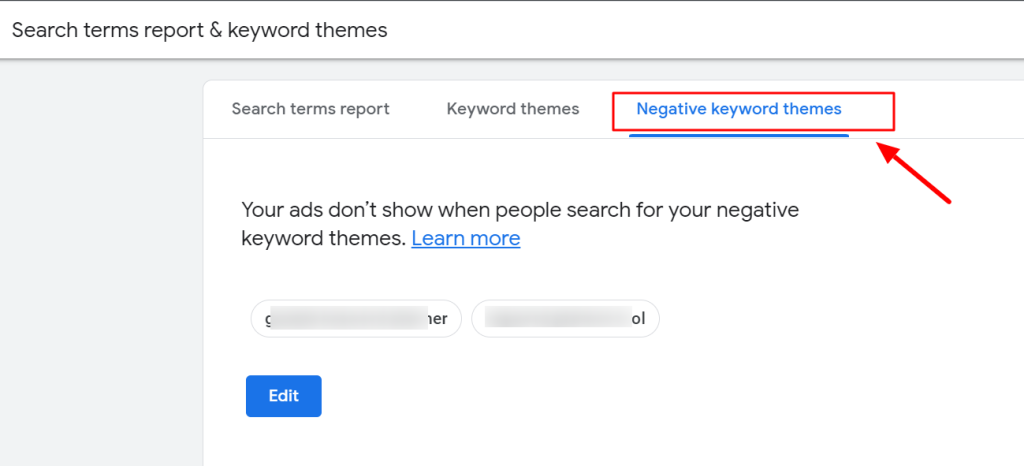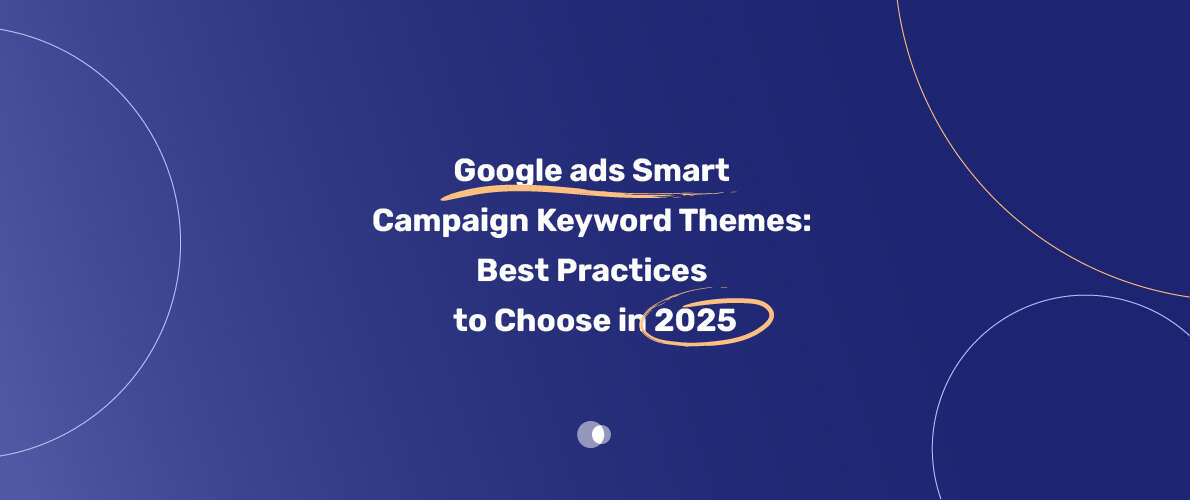In the fast-paced digital marketing landscape of 2025, understanding how to leverage Google Ads Smart Campaign Keyword Themes isn’t just recommended—it’s essential if you want your ads to be seen by the right people at the right time. Whether you’re a bakery in Tehran or a tech startup in Dubai, mastering keyword themes is the linchpin of a successful Smart Campaign. As a Google Ads agency Dubai businesses rely on, we at Admoon have seen firsthand how the right approach to keyword themes can transform modest ad budgets into a steady stream of leads and sales.
Table of Contents
What Are Keyword Themes in Google Ads Smart Campaigns?
If you’ve dabbled in Google Ads before, you’re probably familiar with keywords and the infamous keyword match types (broad, phrase, exact). But here’s the twist—keyword themes in Smart Campaigns are a different animal altogether.
Instead of obsessively building a mountain of individual keywords, Google Ads Smart Campaign Keyword Themes let you provide broader, more intuitive topics. These aren’t just keywords, but clusters of related search intent. For example, the keyword theme “digital marketing agency” will trigger your ad for searches like “best digital marketing company,” “online marketing services,” or even “SEO agency near me.”
I remember when we first tested this at Admoon for a client in the legal niche. We chose just five keyword themes—no more, no less. Within weeks, the client’s call volume doubled, but (here’s the kicker) they weren’t getting irrelevant queries about unrelated legal fields. That’s the magic of keyword themes in action.

How Are Keyword Themes Different from Keyword Match Types?
Let’s be clear—keyword themes are not just a rebranding of match types. In traditional campaigns, “broad match” keywords might show your ad for some tangentially related searches, sometimes to your horror. “Exact match” is, well, exact. And “phrase match” sits somewhere in between.
But in Smart Campaigns, you don’t pick match types. Instead, you select keyword themes, and Google’s AI takes over, mapping your themes to a wide array of relevant search queries. It’s like giving Google a vibe rather than a word-for-word transcript. The algorithm does the heavy lifting—finding similar, high-intent searches you may never have thought of.
This shift is huge. It saves time, removes the need for obsessive keyword research, and (in my opinion) gives small businesses a fighting chance against big-budget competitors.
Why Do Keyword Themes Matter in 2025?
The world is more search-driven than ever. People expect instant answers, and their queries are getting longer and more conversational. “Near me” searches are still going strong—heck, even my dad uses voice search now. In this context, tight, restrictive keyword lists are out. Flexible, intent-based keyword themes are in.
I’ve seen businesses waste thousands of dollars on Google Ads because they were stuck in the old mindset—stuffing keywords, missing the bigger picture. With Google Ads Smart Campaign Keyword Themes, you’re aligning your ads with how real people search today. That’s not just smart. That’s necessary.
Secondary Keywords and LSI: Boosting Your Campaign’s Relevance
If you want to rank for Google Ads Smart Campaign Keyword Themes, you need to think beyond the primary phrase. Here are some secondary keywords and LSI (Latent Semantic Indexing) terms you should absolutely weave in:
- Smart Campaign keyword strategy
- Google Ads automation
- keyword cluster
- Google Ads targeting
- local business advertising
- Google Ads best practices
- search intent
- PPC management
- AdWords optimization
- AI-driven Google Ads
- automated keyword targeting
- Google Ads for small business
- negative keywords
- campaign segmentation
- Google Ads account suspension recovery
- buy Google Ads account
By thoughtfully integrating these into your campaign and content, you signal to Google (and your human readers) that you’re covering the topic deeply and authoritatively.
Choosing the Right Keyword Themes: Step-by-Step
1. Get Inside Your Customer’s Head
First, imagine you’re your ideal customer. What are they typing into Google when they need your service? If you’re an AdWords agency specializing in e-commerce, maybe your customers search for “Shopify Google Ads expert” or “PPC for online stores.” These are your goldmine keyword themes.
Personal tip: I often ask my clients to jot down the phrases their customers use on sales calls or in emails. You’d be surprised—real-world language is often very different from what you expect. It’s those phrases, not industry jargon, that make the best keyword themes.
2. Limit, Don’t Overload
Here’s a rookie mistake: dumping 20 keyword themes into your campaign, thinking more is better. Spoiler—it’s not. Google recommends sticking to 7-10 themes per campaign. Why? Because each theme is broad. If you add too many, you dilute your ad’s relevance and risk showing up for off-target searches.
I’ve learned this the hard way. Once, for a local car repair shop, we started with 15 themes. The result? Ads showed up for “car painting” and “car loans”—neither of which the business offered! We trimmed down to 8, focusing on core services, and the leads improved overnight.
3. No Punctuation, No URLs, No Numbers
This seems nitpicky, but it matters. Google’s system is built for clean, straightforward themes. Avoid punctuation marks, URLs, or phone numbers in your keyword themes. And keep them short—ideally under 20 characters (even less for some languages).
4. Think Campaign Structure: Segment by Intent
If your business offers multiple products or services, don’t squeeze everything into one campaign. Instead, create separate Smart Campaigns, each with its own set of tightly-knit keyword themes. This is campaign segmentation 101.
For example, a home services company might have one campaign for “plumbing repair” and another for “water heater installation.” This ensures your ads are hyper-relevant and your budget is spent wisely.
5. Review Search Terms Regularly
Here’s where Smart Campaigns give you control. Once your ads are live, check the search terms report. If you see irrelevant queries, you can pause those themes or add negative keywords. It’s not totally “set and forget”—treat it as an ongoing optimization process.

Real-World Example: Bakery Smart Campaign
Let’s say you run a bakery in Dubai. Your top keyword themes might be:
- “bakery near me”
- “custom cakes”
- “wedding cake Dubai”
- “birthday cakes”
- “organic bread”
Notice how each theme isn’t just a single word, but a small cluster of intent-driven searches. If someone searches “best bakery in Dubai,” your ad shows. If they search “order birthday cake online,” you’re in the game, too.
And here’s a pro tip: echo those themes in your ad copy and landing page. Google rewards relevance—not just in keywords, but in the overall user experience.
AdWords Optimization with Keyword Themes
You might be wondering—how do you optimize Smart Campaigns if you can’t tweak bids or match types? The answer: focus on your keyword themes, ad copy, and landing page quality.
AdWords optimization in 2025 is less about micro-managing and more about guiding Google’s AI with the right signals. Think of keyword themes as your campaign’s compass. The more accurately you set them, the better your results.
Pitfalls to Avoid with Keyword Themes
- Don’t Get Too Broad: If you pick themes like “business” or “shopping,” you’ll blow through your budget on irrelevant clicks.
- Don’t Ignore Negative Keywords: Yes, Smart Campaigns are automated, but you can and should exclude terms that don’t fit.
- Don’t Forget Your Goal: Are you advertising your overall brand, or a specific service? Align your keyword themes with your campaign’s objective.
- Don’t Mix Unrelated Services: Keep each campaign focused. Mixing “SEO” and “app development” in one campaign is a recipe for confusion (and wasted dollars).
How Keyword Themes Affect Google Ads Account Suspension
This is a topic not enough people talk about. Poorly chosen keyword themes can actually lead to policy violations if your ads start showing for prohibited or restricted queries. At Admoon, we’ve helped clients with Google Ads account suspension recovery—and in a surprising number of cases, the root cause was careless keyword theming.
So, always double-check Google’s policies and make sure your themes are relevant and compliant.
Buying Google Ads Accounts and Keyword Themes
A quick word of warning: if you’re considering to buy Google Ads account from a third party, tread carefully. The keyword themes set by the previous owner could impact your campaign quality, performance, and even compliance. Always reset campaigns and craft new, relevant themes that accurately reflect your own services.
The Role of AI and Automation in Keyword Themes
It’s 2025—AI is everywhere, and Google’s algorithms are smarter than ever. With automated keyword targeting, you’re handing some control to the machine. But that doesn’t mean your job is done. Your input—those carefully chosen keyword themes—are the raw material. Google’s AI molds them into high-performing campaigns, but the initial direction is all yours.
And, as any good PPC management expert will tell you, the best results come from a mix of smart automation and human intuition.
Future-Proofing Your Smart Campaigns
Search behavior evolves. What works today might not cut it next year. Stay on top of trends—voice search, AI chatbots, local business advertising, you name it. Regularly review and refresh your keyword themes. At Admoon, we make it a point to do quarterly reviews for all our clients’ Smart Campaigns. It’s a small investment that pays off big.
And hey, don’t forget about mobile. With Google’s mobile-first indexing, your keyword themes should reflect how people search on their phones—shorter, more conversational, and often driven by location.
FAQ: Your Smart Campaign Keyword Theme Questions Answered
Q: Can I use the same keyword themes in multiple campaigns?
A: Technically yes, but it’s better to segment by service or product. This allows for better tracking and optimization.
Q: How often should I review my keyword themes?
A: At least once a month, or whenever you notice performance shifts.
Q: Do keyword themes impact my ad’s Quality Score?
A: Indirectly, yes. More relevant themes mean better targeting, which leads to higher click-through rates and better performance metrics.
Q: Is there a risk of showing up for irrelevant searches?
A: There’s always some risk, but regular review and negative keywords help keep things on track.
Conclusion: Own Your Success with Google Ads Smart Campaign Keyword Themes
At the end of the day, Google Ads Smart Campaign Keyword Themes are your secret weapon for standing out in a crowded, competitive digital marketplace. They bridge the gap between automation and intent, letting you focus on what matters—growing your business.
If you want your ads to reach the right audience, drive more leads, and get the most out of your budget, don’t leave your keyword themes to chance. Take the time to get them right—and watch your results skyrocket.
Ready to see what a professionally managed Smart Campaign can do for your business? Let Admoon’s experienced team put our proven strategies to work for you. From AdWords agency expertise to hands-on campaign management and even account suspension recovery, we’re your partner for Google Ads success. Contact us today for a free consultation—and let’s put your business at the top, where it belongs!



